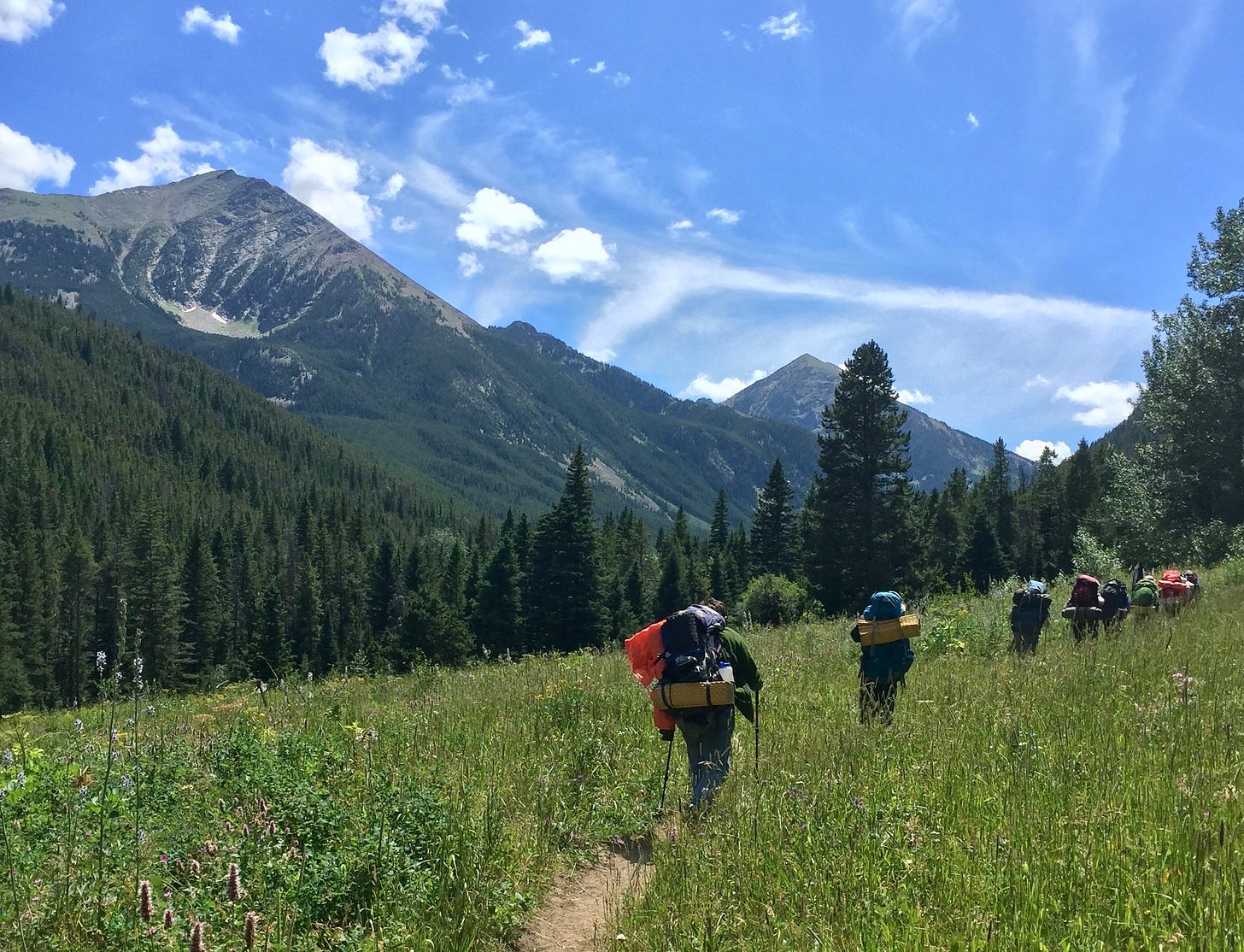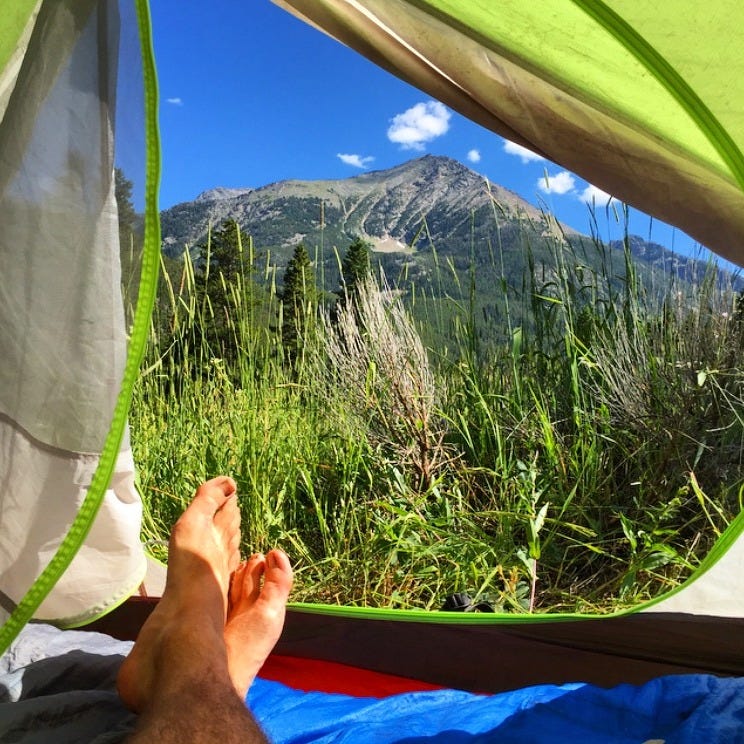Saying Goodbye To The Little Engine That Should
And other things you thought you had to carry.
I thought maybe I’d imagined it. Until I heard it again. Then, in the darkness, I listened closer and tried to ground myself. Running through a list of what I knew to be true, I suddenly understood what the sound was.
And I’m not sure I’ve ever been more conflicted in my life.
It was the middle of the night and I was back in Massachusetts. This room of my dad’s house used to have bunk beds, but it’d been many years since they were stacked vertically as such. Now, they lay next to each other—bisecting the room into halves, framing either side of the doorway. My step-brother and I used to share the room, though it was rare for both of us to be there at the same time. Come to think of it, I couldn’t remember the last time we and our two sisters had been in the same place, all together. Until now.
It was December of 2012, my grandmother had just passed away and I was in town for her services. My grandfather had been staying with my dad. And in the bed next to mine, the sound of his sobbing continued.
I forced myself to lay frozen while I tried to make sense of things.
Aside from expressing a very witty—albeit dry—sense of sarcasm, my grandfather was pretty reserved. I suppose most men of his generation would fit that description. But even now, surrounded by family, he wasn’t allowing himself to grieve visibly like this. Not to this extent.
My heart broke for his, which had irrevocably been shattered. But the urge to reach out and comfort him got caught in my throat. He very clearly didn’t want people to see his tears flowing this freely, or to hear the low, guttural agony of his loss.
So I didn’t do anything. And I still think about it.
We’d have just one more Christmas together before he passed. And I showed up late to the last birthday he’d celebrate because I was hungover.
I haven’t forgiven myself for that, either.
We learn what we should or shouldn’t do from the mistakes of our parents—it’s only fitting we adjust as we make our own.
My dad’s parents were Irish and Scottish. My mom’s, German and French-Canadian. Though my parents split when I was three, there were some parallels that spanned each family dynamic for me growing up. I learned pretty early that there were things we could do, and there were things we definitely could not do. This looks different for everyone, but is usually something that all of us experience in some form.
These norms shape us. They mold our lives: from the subjects we study and the careers we choose for ourselves, to the friends we keep and the love we’re able to share with partners.
I used to wonder what led some people to believe they should do something while others held firmly that they should not. Well, I figured it out. Maybe you’ve heard the phrase “you can lead a horse to water, but you can’t make it drink.” What they don’t say is why. We’re meant to assume the horse is being stubborn. But, what if it just values something else more? Like autonomy. Or dignity. Maybe it just doesn’t like doing what it’s told.
If you’ve not encountered this situation with someone else, I’m almost certain you’ve played this guessing game with yourself. It can be infuriating.
Guilt, shame, and fear are why you ‘should’ on yourself.
This looks different for male and female identifying folks. I’ve written about gendering behavior before, and you bet I will again. But for this conversation, I’m going to leave it at saying that actions don’t have a gender. Nor do personality traits.
We, the people, create those norms through the expectations we put on kids from the moment they’re born.
When values and behavior don’t line up, it’s because of mismanaged expectations.
By high school I’d abandoned most of myself, adhering to what I thought I should do.
I’d banished my dream of being a writer and an actor in favor of the more practical path I’d felt was expected of me. So I told people I’d become a lawyer. My love of music was replaced with a focus on sports. I’d admonished myself for my queerness. And learned to hate myself for the neurodivergence I hadn’t been diagnosed with yet.
Let it be known that I was the king of putting on theatrical dinner shows for a hot minute there. But it started to fizzle by elementary school. It happened pretty fast, too—I started to feel the judgement. The kind that feels like laughing at you and not with you. And looks like facial expressions that say “we don’t do that.” Or so I thought.
Now, all these years later I wonder if there was a bit of worry in there, too… a knowing of who I was. And that it would mean that life might be harder, more cruel.
We inherit expectations along with wants, hopes, and dreams—learning to let go of them takes longer than we think.
It’s a shame we only find out about the depth of love around us after reaching a boiling point from feeling its absence. We spend a lifetime telling ourselves to adapt and then, maybeeee, we’ll earn it. I wish we talked more openly about the different ways people express love. And about the role of attachment theory in how we learn to operate.
I ran on fumes for years, oscillating between high performance and burnout. Depression came and went, anxiety was constant, and my nervous system lived in overdrive. When I first learned what an ACE score was, I had a nervous breakdown. I was shocked I’d scored so high, and then became convinced there must be an underlying health concern waiting for me like a jack-n-the-box.
Who knows—maybe there still is?
Sometimes I truly did feel like the little engine that should…completely wrapped up in finding ways of pushing forward out of fear. God forbid I be seen as inferior. Or worse, incapable.
Composure mattered a lot in my family. Looking like you had it together was the love language we were taught.
The first time I think I ever took a real, proper deep breath I was 20 years old. Coincidentally, it was a month after that last birthday party for my grandfather. Yes, the one I was late to.
It was when a leadership development program brought me to Wyoming. I remember being 2,000 miles away from the place I’d grown up and feeling as though I were home. Like I could breathe. And hear myself think. For the first time ever.
My grandfather passed away that fall. I’m ashamed to say I don’t really feel like I knew him. My sister was close with him, though. They had a pretty cool relationship. We spent holidays together, mostly. But I didn’t know how to be myself around my family, so I wasn’t very interactive with anyone—let alone he and my grandmother.
It wasn’t until after their passing that I feel like I’d found my footing in life. My underdeveloped coping skills, which had pointed me toward substance use, had finally become a full-fledged, emotional intelligence toolbox. Those skills and a passion for the outdoors led me to a career as a guide, before eventually pivoting to tech and business strategy.
Being honest with yourself starts with feeling safe.
It wasn’t until recently that I recognized the familiar feeling I’d been trying to place. Somehow, I’d unknowingly climbed back onboard the little engine that should.
Among the stress of running my own business, I’d defaulted to my once-embedded love language of composure. And maybe a little bit of posturing… None the less, I’d noticed I’d been trying to force an arm of my business to work when it wouldn’t—and shouldn’t. It took a lot of honesty to admit to myself it was the same as trying to make people focus on the fact that I played sports so they wouldn’t question my sexuality.
Yeah…because that logic checks out.
Listen, I’m 31.
This year is the first time I’ve been able to journal without writing as if someone else would be proofreading it. Without worrying that my words would be used against me.
I’ve journaled on and off for most of my life. Sometimes, there’s been multi-year gaps in between. But I always end up finding my way back. After all, journaling is for being honest with yourself. I’m sorry that I’ll never again see the world through the non-judgemental eyes of the me who sang, danced, performed, and wrote without considering the opinions of others.
Something I’ve learned is that to be truly honest with yourself, you need to feel safe enough to be uncomfortable. It feels like willingness. Which means reaching a place where you can initiate your own discomfort and trust that you’ll be ok. And that’s the hardest part. It can be incredibly difficult if you’re used to defending yourself from all the times someone else initiated it.
Being honest with yourself looks like asking what happened, and listening for the answer. It’s the courage to offer your thoughts without flinching at what could be held against you. From others, sure…but also by you.
Being honest with yourself means acting like your own best friend.
There’s nobody in this life you’ll spend more time comforting than yourself. So make sure you feel safe enough to risk being vulnerable.
And comfortable admitting when you’re not.
onward.
If you enjoyed reading and want more of this kind of thing, I write short reflections like it each day as part of my daily column.
Sign up to get it here.






Oh gosh, feeling this, there are always those moments of regret where you just have that pang of wanting to rewind time. Really lovely honest share, and congrats on breaking that whole mindset of 'I'm writing this with an editor over my shoulder', Derek.